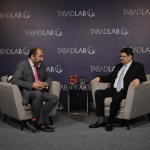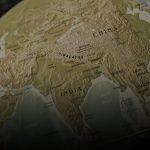You can download the e-reader friendly version here.
COVID-19: What challenges lie ahead?
The public health emergency triggered by the Covid-19 pandemic has instigated an economic crisis across the world. As businesses shut shop and unemployment soars, Pakistan has witnessed impassioned debates over the supposed trade-off between lives and livelihoods. The panellists at Tabadlab’s Policy Roundtable discuss long-term models for understanding this pandemic, the inevitable fiscal deficit Pakistan is faced with, and the possibilities of recovery for a fledgling economy.
Featured Panelists:
 Dr. Aisha Ghaus Pasha is a Member of the National Assembly who has previously served as the provincial Minister for Finance in the Punjab.
Dr. Aisha Ghaus Pasha is a Member of the National Assembly who has previously served as the provincial Minister for Finance in the Punjab.
 Aamir Ibrahim is the Chief Executive Officer of Jazz, Pakistan’s largest telecom services firm.
Aamir Ibrahim is the Chief Executive Officer of Jazz, Pakistan’s largest telecom services firm.
 Dr. Samreen Malik is Associate Professor of Economics at New York University, Abu Dhabi.
Dr. Samreen Malik is Associate Professor of Economics at New York University, Abu Dhabi.
 Maheen Rahman is the Chief Executive Officer at Alfalah GHP Investment Management Ltd.
Maheen Rahman is the Chief Executive Officer at Alfalah GHP Investment Management Ltd.
 Ammar Rashid is a researcher, academic and political worker who has worked extensively as a development professional.
Ammar Rashid is a researcher, academic and political worker who has worked extensively as a development professional.
Discussion Summary:
Research-guided policy
The pandemic has also made available copious amounts of research to guide governments through this pandemic. To what extent is the Pakistani government’s policy architecture built upon this research? What are the sources, local or international, which inform the decision-making process at the highest levels?
Fiscal deficits
Alongside macro-level concerns like inflation, investment and interest rates, what are the predictions for the fiscal deficit? How will the government generate tax revenue in a contracting economy with bleak forecasts (under 1%) for growth next year? And how will an expansionary budget be made possible?
Long-term impacts
Can the economic effects of this pandemic be understood in a linear manner or must the scope of debate be expanded to a wider field? The multiplicative dynamics of Covid-19 are such that forecasts and numbers can’t be categorised into direct costs or benefits. What are the long-term implications of short-sighted policy as we brace ourselves for an economic downturn.
Digitalization Opportunities
Mobile wallets, financial technology, data analytics — our panellists argue in favour of utilising the Covid-19 crisis as an opportunity to make the long-awaited digital transition. Could the Ehsaas Emergency Cash distributions have been the digital enabler for millions? And how can existing data be put to more effective use in the decision-making process during this time?
SMEs vs. Corporates
Have the State Bank’s refinancing schemes targeted the most deserving sectors and businesses in Pakistan? Or have the benefits been usurped by bigger organisations in the corporate sector? Are SMEs and the informal sector not interested in utilising the relief provided by restructured loans and wage subsidies or does the design of schemes need to fundamentally change?
Social Safety nets
Will the upcoming budget make room for the basic social safety nets that are necessary for a lower socioeconomic segment to survive a lockdown? Will policymakers be able to move towards a decentralised system of food and health provisions? And how can delaying the push for low-income housing prove to be detrimental in the face of a pandemic?
Recovery
Our panellists weigh in heavily on what the road to recovery for Pakistan could look like. What are some of the statistics which indicate how and when the country could start making an economic bounce-back? Which fiscal and health policies are required to be implemented now in order to get there eventually and where in the world can Pakistan look to for inspiration?
Recommendations
• Ensure policymaking is proactive and guided by research and verifiable data
• Interpret the pandemic in a non-linear and multiplicative manner
• Understand the intricate relationships between economic and health policies
• Reorient relief efforts to protect the most vulnerable groups
• Capitalize on the opportunity to make digital leaps
Key Resources:
KPMG (May 2020) – Impact of COVID-19 on Pakistan’s Economy
United States Institute of Peace (USIP) – Pakistan’s Coronavirus Crisis: Impact and Solutions
Ahmad Naeem Salik (May 2020, ISSI) – Impact of COVID-19 on Economy of Pakistan
The Express Tribune – Covid-19 and the economy
A Resident Fellow and Head of Growth at Tabadlab.







